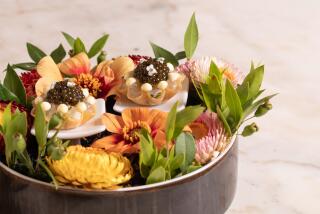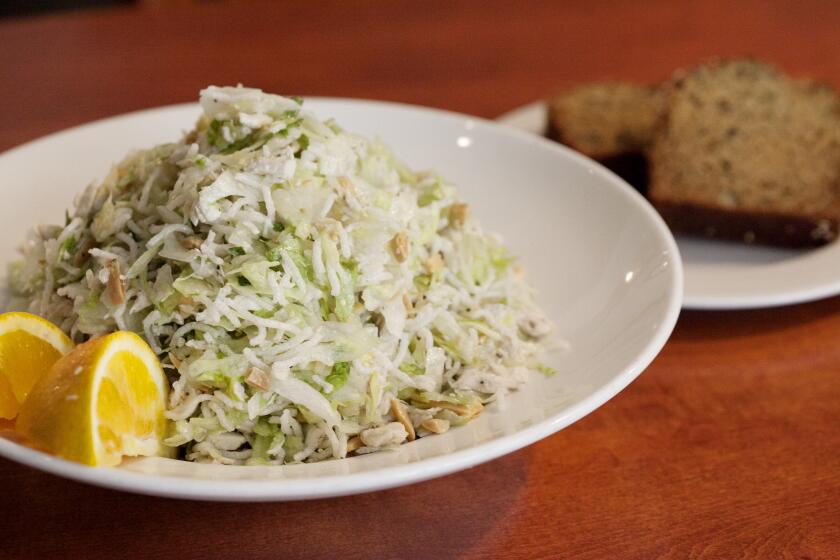Across the Table: The accidental sommelier student in Paris
- Share via
Who wouldn’t say yes? When the dean of the professional cooking school where I’d enrolled many years ago as a special student in wine realized he wouldn’t have the time to tutor me, he proposed something else: studying in Paris. “There’s a professional program given through the French Restaurant Union for junior sommeliers already working in Michelin-starred restaurants,” he told me. “You speak French, right? I’ll transfer your tuition money there. It starts in two months.”
I was thrilled. Instead of BART, I’d be taking le metro to classes, and where better to learn about French wine than Paris? I’d taken the dean’s word that the course was worth doing. He didn’t have many details, just that the class would be held at L’Academie du Vin just off Place de la Madeleine. The profs would be the sommelier at a three-star Michelin restaurant and eminent French wine writer Michel Dovaz.
EXTRA: Wine classes in Los Angeles
Eight or 10 of us convened around the horseshoe-shaped bar three times a week. Three? I thought it would be much more intensive. I’d come equipped with a professional cassette tape recorder provided by a sound tech friend. I figured I could listen again later if I missed anything.
The rest of the class? All men, all teenagers, really, 20 at most. And mute as far as I could tell. Not a word issued from anybody’s mouth for weeks. Monsieur Dovaz would ask a question or request an impression of the wines we were tasting. Silence. Finally, I got the courage to speak up in my then-pitiable French — decent vocabulary, shaky grammar (present and past tenses only), good accent thanks to Madame, who taught me in high school.
I came to realize my fellow students were just kids who had been separated out early on, like cooks, for a non-university path. School learning was not a strong suit for them, and they were scared to make a mistake or appear foolish. I also found out that, though these junior sommeliers worked in illustrious restaurants, they didn’t get to taste wine as part of their job or training, which is why they were at this class — to experience firsthand some of the wines on their lists.
I felt very lucky to have Monsieur Dovaz. He was less interested in Bordeaux and Burgundy than in exposing us to other, lesser-known appellations. And not just the current vintages. Vignerons would send him bottles of old, legendary vintages it would have been impossible to experience otherwise.
I remember tasting a 1947 Vouvray from the Loire that rocked my world, decades-old bottles of Hermitage and Côte Rôtie from the northern Rhone and a fabulous aged Châteauneuf-du-Pape blanc that tasted like white peaches and hazelnuts.
We learned about vin jaune from the Jura, obscure grapes from the Haute-Savoie, savored astonishing Rieslings and Tokay Pinot Gris from the best vineyards in Alsace and got a crash course in Chenin Blanc of every ilk from the Loire valley.
Palates stretched and pulled like taffy as we tasted through earth, acid, sweet, spicy. We learned the particular French vocabulary for understanding and describing wines, which still leaves me searching for words in English. And in the end, not to be outshone by the sole woman in the class, those boys began to speak up, albeit hesitantly, and express an opinion.
Did I get enough of an education to pass myself off as a sommelier? Maybe enough to fake it if I had to, but not really. But by then I couldn’t see myself patrolling the dining room of a stuffy restaurant, tastevin hung around my neck, sparring with wine geeks over vintages or vineyards.
I started writing instead, as a way to keep traveling and learning. I had an itch to go see those vineyards and meet those winemakers. That’s where my real wine (and food) education began. And that’s a whole other story.
More to Read
Eat your way across L.A.
Get our weekly Tasting Notes newsletter for reviews, news and more.
You may occasionally receive promotional content from the Los Angeles Times.










